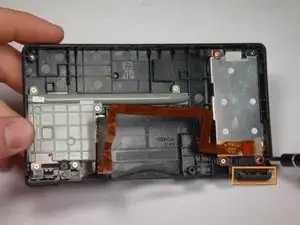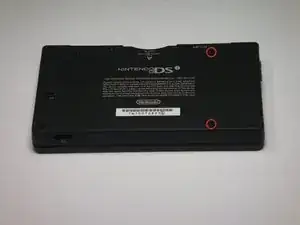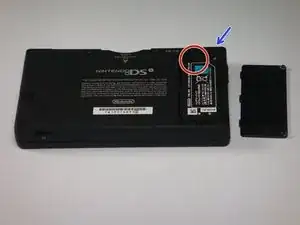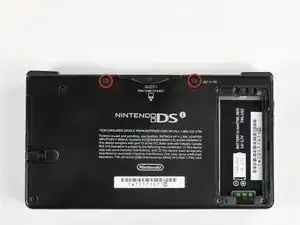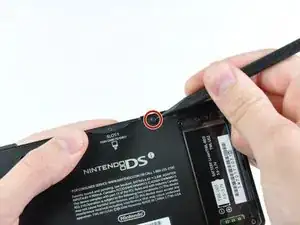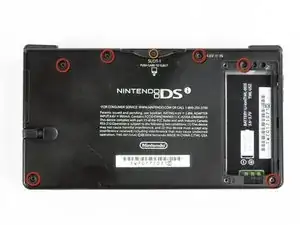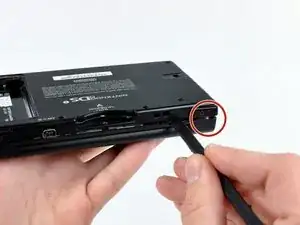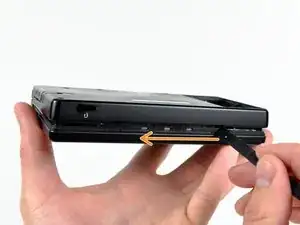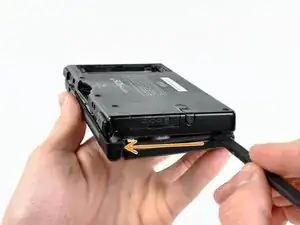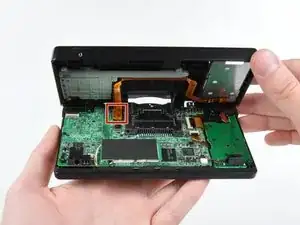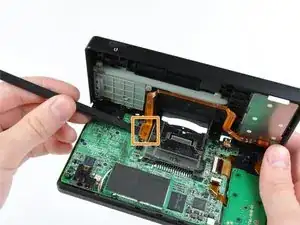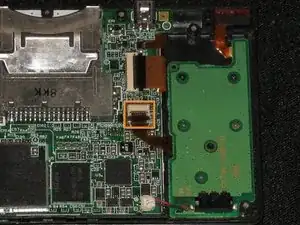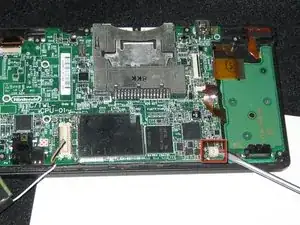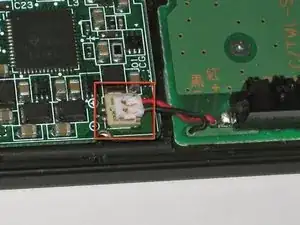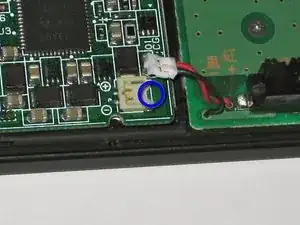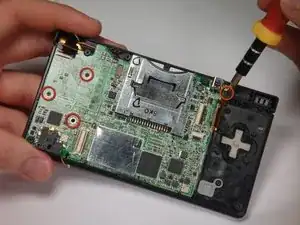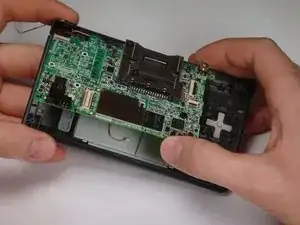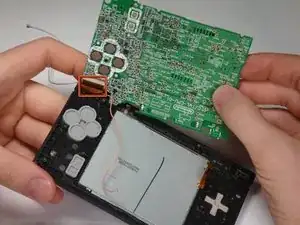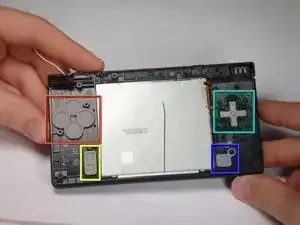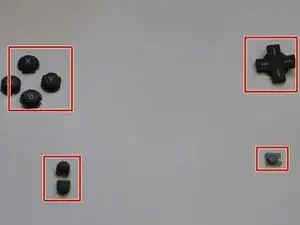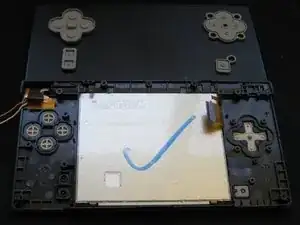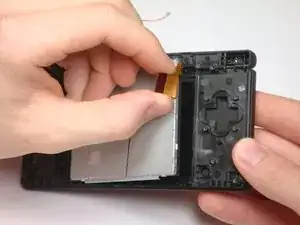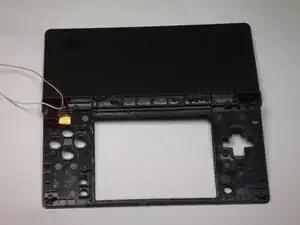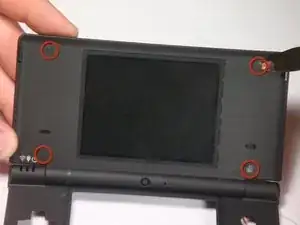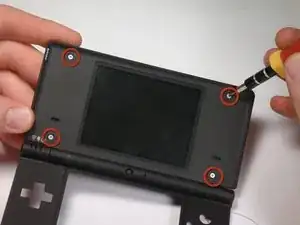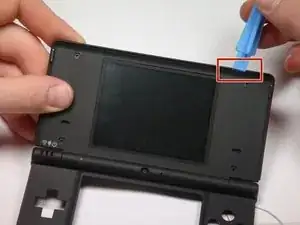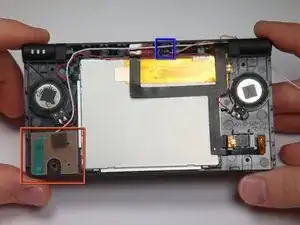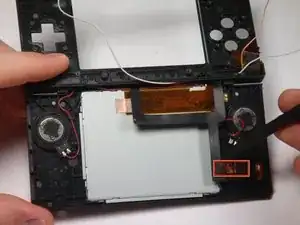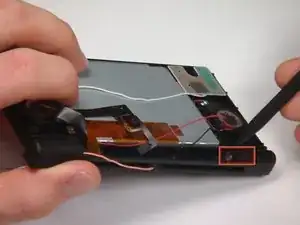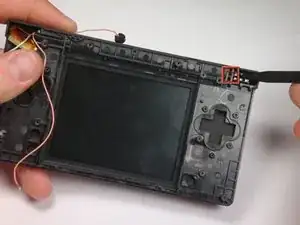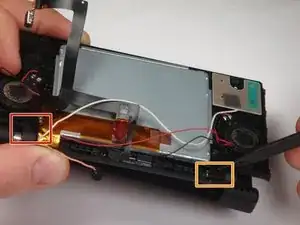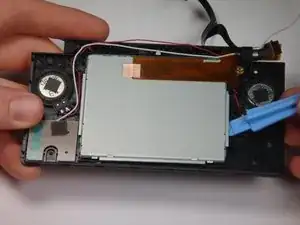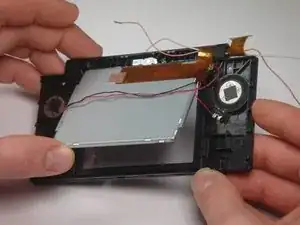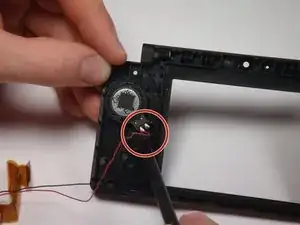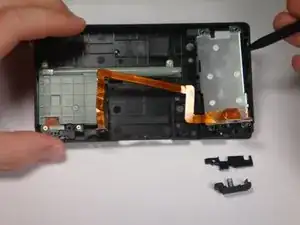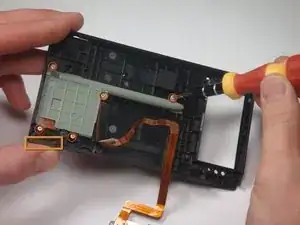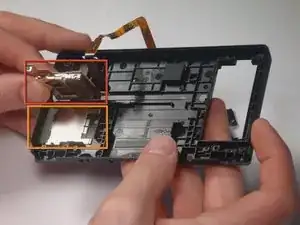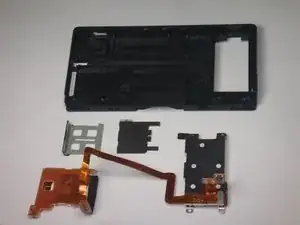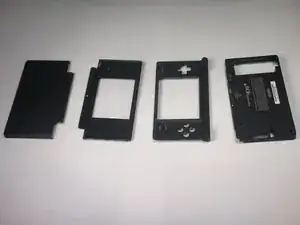Werkzeuge
Ersatzteile
-
-
L Button.
-
Top of the battery pack.
-
To remove the battery pack, place your fingernail or a spudger at the top of the battery near the L button. Gently lift the battery out.
-
-
-
Two screws are hidden underneath two rubber feet highlighted in red.
-
Use the tip of a spudger to pry the rubber feet out of the lower case.
-
-
-
Remove the following screws securing the lower case to the body of the DSi:
-
Six 5.2 mm Phillips #00 screws.
-
One 2.7 mm Phillips #00 screw.
-
-
-
Insert the spudger in between the lower casing and lower panel near the top right corner of the DSi.
-
Carefully run the spudger along the edge of the outer casing, creating an opening between the body and the casing.
-
Continue running the spudger around the body of the DSi until the majority of the lower case has been separated.
-
-
-
Carefully lift the lower casing from its bottom edge.
-
Pry the volume and SD board cable up from its socket on the motherboard using a spudger.
-
Once the cable is completely removed, then you may take off the entire outer casing.
-
-
-
The connector is two pieces -- a white "male" piece (connected to the wires), and a beige "female" part (soldered to the main board).
-
There is a small "notch" in the female part, to give you a place to insert a small flat-head screwdriver. Put the corner of your screwdriver in there, and twist it gently to push the white part up (away from the main board). Do not try to pull it to the right (towards the battery board).
-
-
-
Remove 4 Phillips screws from the board.
-
Lift the main board from the bottom end and flip it over to reveal the last connector.
-
-
-
Disconnect the ribbon cable by gently using a plastic opening tool to flip up the black connector latch. The cable should easily slide out from the connector.
-
The motherboard should now be free from the rest of the device.
-
-
-
Place a plastic opening tool between the front panel and top edge of the outer case. Slide the tool along the edge as needed to prop open the case.
-
With the screen facing you, slide the screen side down with your thumbs to separate the screen from the cover.
-
-
-
Remove the antenna from the bottom left of the device.
-
Remove the microphone from the top of the frame.
-
-
-
Start by pushing the sliding shaft in the hinge on the opposite side of the wires/ribbons.
-
-
-
On the reverse side of the casing, insert the spudger onto the surface of the sliding shaft just left of the LED light channels.
-
Push the sliding shaft completely through the hinge until it stops and the hinge is released.
-
-
-
The right side of bottom case should separate from the top case when you remove the sliding shaft.
-
Slide the top case to the right to separate the joint.
-
Weave the wires and ribbons through the wire hinge to completely separate the top and bottom casings.
-
-
-
Lift the top LCD out of the plastic frame. Carefully thread the ribbon cable out of the hinge to avoid damaging it.
-
-
-
On the bottom cover, use a screwdriver to remove the 3 Phillips screws holding the battery compartment.
-
Removing the 2 lower screws also removes the "L" trigger.
-
-
-
Use a screwdriver to remove the 5 screws on the stylus holder.
-
Also disconnect and remove the "R" trigger button, which is held in place by two of the five stylus holder screws.
-
-
-
Under the stylus holder is the SD card port.
-
Gently lift the SD card port off the bottom cover.
-
Remove the metal shield and flap from under the SD card port.
-
-
-
This picture shows the LCD screen, battery compartment, and SD card slot (metal shield and flap) with bottom outer casing.
-
-
-
The complete DSi outer casing can now be replaced. Parts listed left to right: top cover, top LCD screen casing, touch LCD screen casing, and bottom cover.
-
Follow the guides for the replacement of the DSi components backwards with your new outer casing.
-
To reassemble your device, follow these instructions in reverse order.
Ein Kommentar
Pictures are too dark to properly see where the structures mentioned in the text are, but worse than this, Steps 21 and 22 do not properly explain the “twist” method that you need to use with extreme caution! This is the Achille’s heel of dismantling the device and if you’re gonna make a mistake, let this not be the one…
